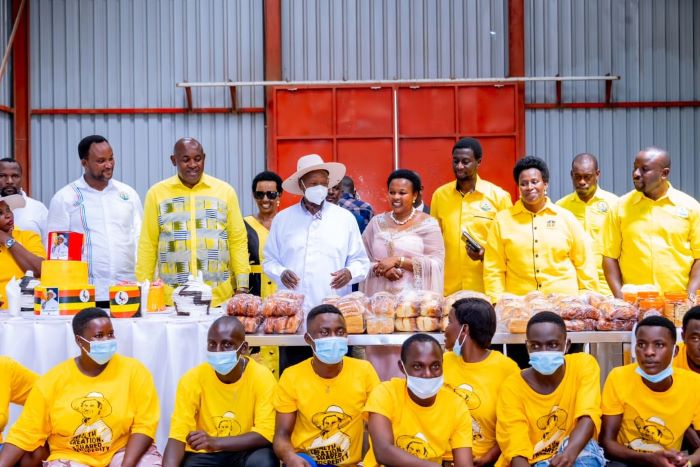NTOROKO, May 15, 2025 –– President Yoweri Museveni has reaffirmed that Uganda’s path to true liberation lies not only in political leadership but also in the advancement of technology and practical skills training.
Speaking during the official launch of the Presidential Zonal Industrial Hub in Ntoroko district on Tuesday, the President highlighted the dual purpose of the skilling hubs.
“Skilling hubs have two main objectives: to create wealth and empower people. Wealth comes from people,” Museveni said.
Reflecting on Africa’s colonial experience, Museveni argued that the continent was not conquered due to a lack of leadership or culture, but due to a deficiency in technological advancement and practical skills.
“During colonial times, we had kings, poets, witch doctors, and priests, but no technology. That’s why the Europeans prevailed,” he noted.
He stressed the importance of the hubs, particularly for underprivileged youth who missed out on formal education. The centres, he said, provide free accommodation, meals, healthcare, and hands-on vocational training.
“These children were like food without salt. Now, I have added salt, and it is tasteful,” the President remarked.
Museveni also criticised some local leaders for undermining the implementation of Universal Primary Education [UPE] and Universal Secondary Education [USE], introduced in 1997 and later respectively.
“We introduced UPE and USE to provide free education. But some leaders sabotaged the policy by charging fees. I said the children of the poor must study up to A’ Level or beyond. The policy failed because of what we call okwelagira—doing things your superior hasn’t instructed you to do,” he explained.
He reiterated that all children, particularly those from disadvantaged backgrounds, must be supported to pursue their education.
“These children are government property. And now, they are becoming valuable to society,” he said, calling for a renewed national focus on building more schools, hiring teachers, and fulfilling the NRM’s vision of accessible education.
To support graduates of the skilling hubs, Museveni announced a donation of Shs 10 million to each cohort, encouraging them to become job creators rather than job seekers.
Deputy Speaker praises initiative
Deputy Speaker of Parliament, Thomas Tayebwa, commended the President for establishing the hubs, describing them as transformative in tackling youth unemployment and rural poverty.
“These hubs are a bold statement of confidence in our youth. After UPE and USE, this is the missing link that equips them to become job creators,” Tayebwa said.
He pledged Parliament’s continued support and urged communities to safeguard and sustain the hubs.
“What we are witnessing today is the transformation of lives. A girl now owns a salon. A young man is saving to build rental units. These are real stories of hope enabled by this initiative,” he added.
Local Leaders hail progress
William Kasozi, Zonal Chairperson of the Presidential Skilling Hub, expressed gratitude to President Museveni for selecting their region.
“This hub has enabled job creation and shifted our youth from subsistence to income-generating activities,” Kasozi said.
He reported that the current intake consists of 897 trainees—378 girls and 519 boys—from Fort Portal City, Bundibugyo, and Ntoroko districts.
Kasozi also announced the formation of a skilling hub SACCO to support graduates with start-up capital and promote entrepreneurship.
He shared key directives from the President, including increasing the number of instructors from 240 to 400, expanding accommodation, and introducing new courses such as weaving, plumbing, automobile mechanics, and electrical installation.
With Ntoroko’s rural electrification rate at just 8 percent, Kasozi said the electrical installation course would be particularly beneficial.
“These courses will empower our youth to contribute meaningfully to local development,” he noted.
Beneficiaries share their stories
Moses Mutegeki from Ntoroko district enrolled in the construction course in 2024. After graduating, he began building homes and later secured employment with an NGO in Kagadi using his certificate.
“I now train fellow youth and earn a salary,” Mutegeki said.
Together with his peers, Mutegeki formed a construction group that secured Shs 8 million through the Youth Livelihood Programme [YLP]. Part of the funds supports a salon business, while the rest will be invested in a paver-making enterprise.
Christine Sanyu from Bundibugyo, who heard about the programme via radio, trained in hairdressing.
“Starting with savings of just Shs 2,000, I now own a salon and employ others,” she said, crediting the Presidential Initiative for her business knowledge and self-confidence.
Buy your copy of thecooperator magazine from one of our country-wide vending points or an e-copy on emag.thecooperator.news
